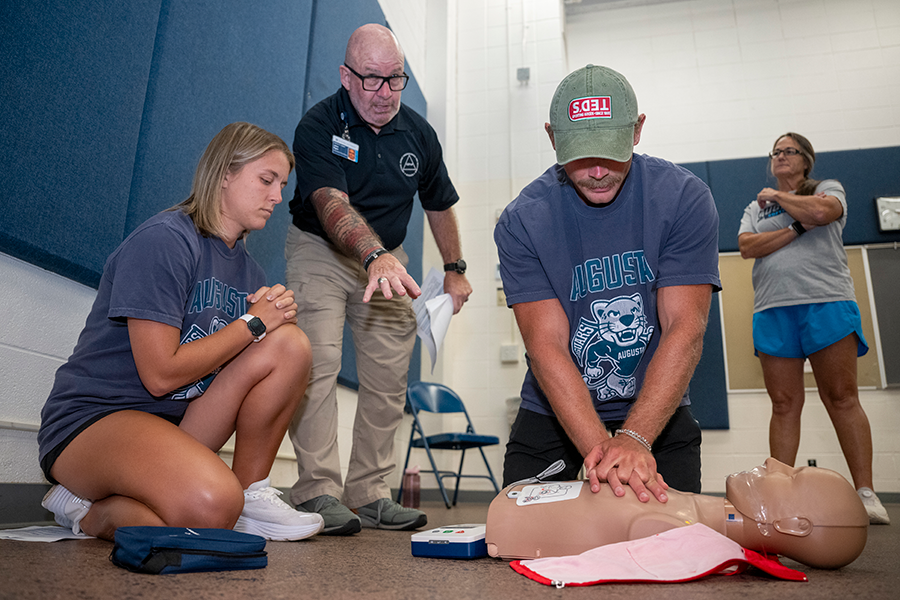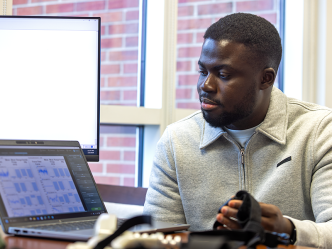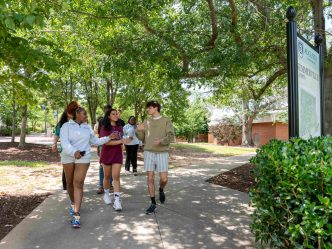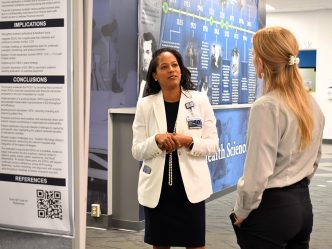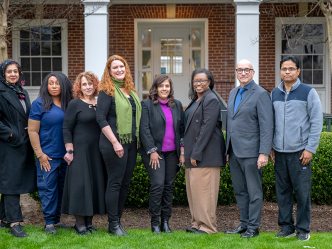Most people know what to do if there is an emergency in the workplace or when they are out in public. If there’s a fire, you pull the nearest fire alarm, and, if able to do so safely, you grab the nearest fire extinguisher and try to suppress the fire. If someone has a cardiac event, you find the nearest AED and attempt to keep the individual alive until paramedics arrive. And if someone is badly cut, you locate the nearest Stop the Bleed or first aid kit.
But what if someone is clearly suffering from an opioid overdose? And what does that look like?
That is something that is becoming vitally important as much of the country is in the grips of the ongoing opioid epidemic.
Thanks to Augusta University’s School of Public Health, the Office of Critical Event Preparedness and Response and Student Health Services, with support from AU’s Division of Facilities Services, AU is equipping students, faculty and staff with a way to help those who might be suffering from an overdose associated with opioids, while also centralizing the various critical first aid needs.
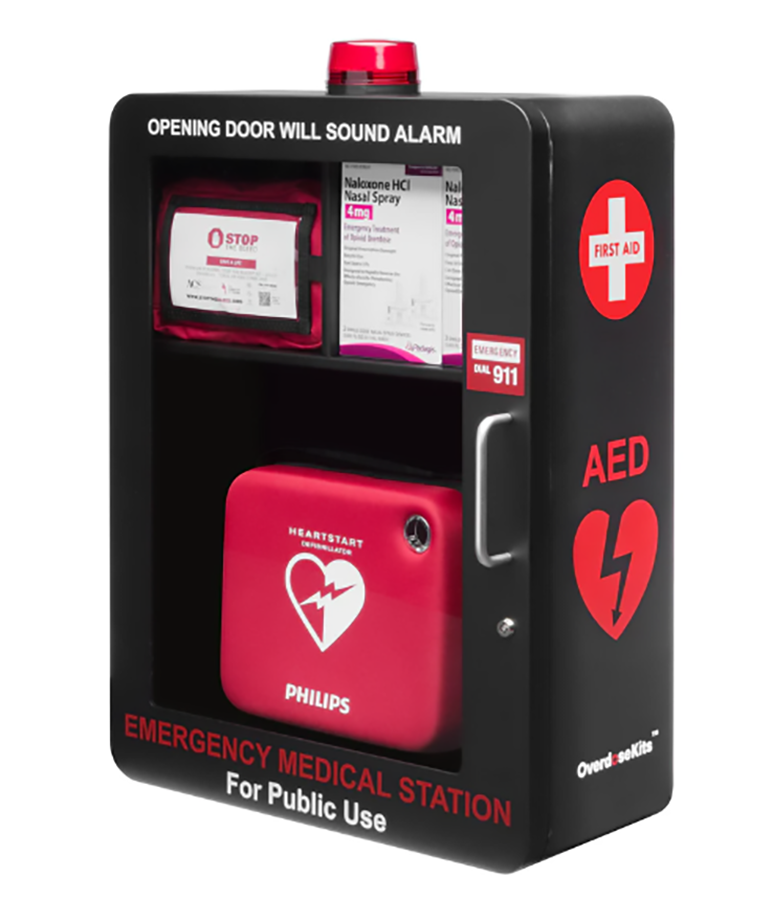
Beginning this fall, 21 new SAFE Station cabinets are being placed in key locations around AU’s campuses. SAFE stands for safety, AED, first aid and emergency. On the Summerville Campus, cabinets will be placed in Reese Library, the Jaguar Student Activities Center, Allgood Hall and University Hall. On the Health Sciences Campus, the cabinets will be located in the Robert B. Greenblatt, M.D. Library, Elm Hall, Oak Hall, the Health Sciences Building, J. Harold Harrison, M.D. Education Commons, the Core Building and the Student Center, which will have two. On the Forest Hills Campus, six cabinets will be placed in University Village, and two will be added to Christenberry Fieldhouse.
“Placing SAFE Stations strategically around our campuses is a proactive effort to keep all of our students, staff and faculty safe in the event of various emergency situations that can often be stabilized while first responders are on the way,” said John Ryan, a CEPaR coordinator.
Last year, Catherine Clary, JD; Aaron Johnson, PhD; Paul Seale, PhD; Kit Wootten and Katherine Hatcher, along with Georgia Council for Recovery, were awarded a one-year, $300,000 grant from the Health Resources and Services Administration’s Rural Communities Opioid Response Program for the Decreasing Overdoses in Northeast Georgia project, also known as DOiNG. The grant, which was part of a series of three grants totaling nearly $5 million to continue projects addressing the opioid epidemic, provided an immediate response to opioid overdose morbidity in a nine-county region of Georgia that included Banks, Elbert, Franklin, Habersham, Hart, Jackson, Rabun, Walton and White counties.
“For several years, our SPH team has been working with Dr. Nicole Winston in MCG to provide Narcan and training on how to use it to our medical students,” said Clary, who led the efforts to have the cabinets introduced at AU. “Out of that, we were trying to figure out how to train more people around campus and make Narcan accessible on campus, should people encounter someone experiencing an opioid overdose.”
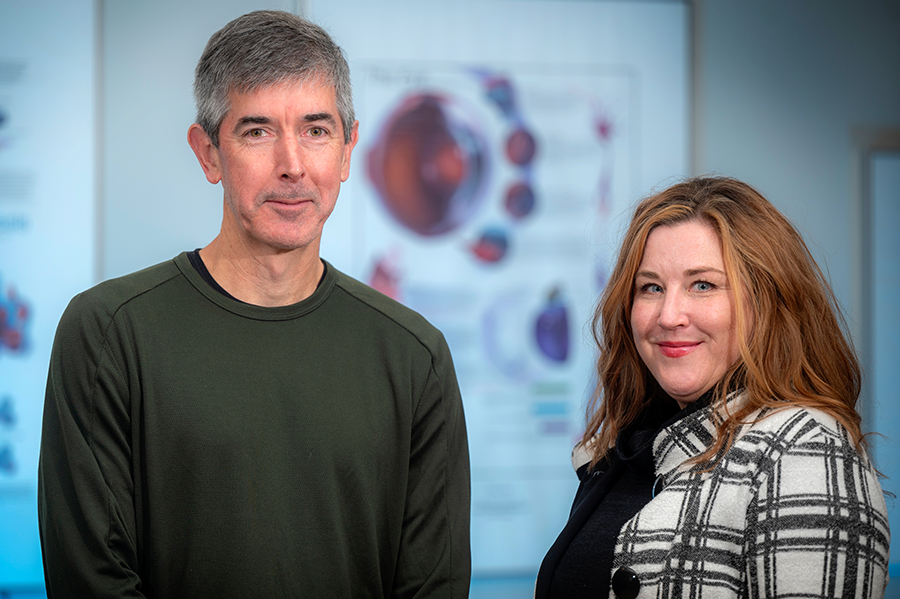
Through DOiNG, the team from AU worked with community partners in northeast Georgia to expand access to naloxone, also known as Narcan, an opioid overdose reversal medication, and fentanyl test strips through strategic, targeted distribution. In addition, the project included training peer recovery support specialists in local service delivery sites, including emergency departments, primary care offices, jails and behavioral health clinics, offering certification and formal training for peer recovery coaches and establishing a new recovery community organization.
Jon Langston is a member of one of those recovery community organizations, REBOOT Jackson, which he founded in 2018 with his wife, Jenn Langston.
As someone who will have been in long-term recovery for 17 years this September, Jon has made it part of his mission to help others in recovery, even earning certifications as a certified addiction recovery empowerment specialist, certified peer specialist – addictive diseases and forensic peer mentor. Together, the Langstons have worked with the Georgia Council for Recovery and received certification from the Department of Behavioral Health to offer peer support to those in the county they call home.
“Our goal is to be a voice for recovery in north Georgia, and it’s been really amazing to watch people put recovery as the expectation and for REBOOT to be that positive voice for recovery in North Georgia,” Langston said. “Our team has been nothing but a blessing, not only to us, but to the community and our peers. Thanks to Jenn’s hard work, we’ve been able to grow our network and meet people, and it allows me to go to the Capitol to work on recovery-related legislation.”
Part of his efforts included building similar safety boxes and installing them in locations around northeast Georgia, including in police stations, Piedmont College, bars and hotels. During the COVID-19 pandemic, Langston and some of his fellow opioid antagonists formed a motorcycle club that worked to raise money, purchase Narcan kits and then delivered them to sheriff’s departments. Since then, they have delivered between 11,000 and 12,000 doses to sheriff’s departments all over north Georgia.
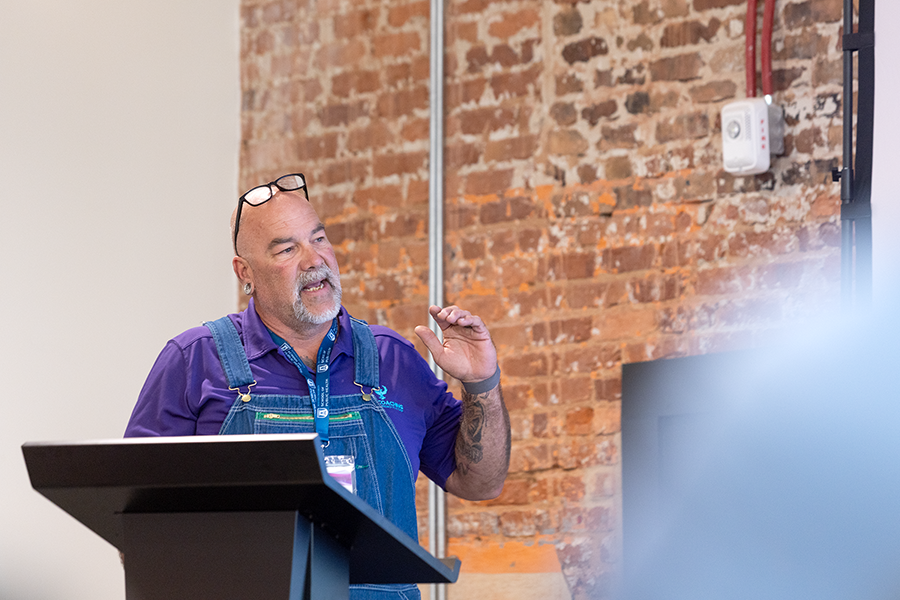
He even helped to draft a bill helping universities and other educational institutions to be able to have these SAFE station boxes more readily available. While the bill did not pass during the 2025 legislative session, those associated with this effort are hopeful to continue to raise awareness during the next legislative session.
“We built up a really good rapport with the sheriff’s departments across the state, and we began to think we needed legislation to really help our efforts go further,” Langston said. “That was when we first started working at the Capitol, and I want to give a big thanks to Rep. Lee Hawkins from Hall County; he’s very adamant about recovery issues. He was a big help, and, in the process, Gov. Kemp said he wanted these kits in the state Capitol, so we ended up putting four kits throughout the Capitol before the legislation even made it to the floor. From there, they said government agencies that have an existing AED box have to have an overdose reversal kit located near the AED, and that was the first legislation that we got passed. It’s just kind of grown from there.”
While working on a solution for getting similar cabinets installed at AU, Clary was informed about a similar effort at the University of Georgia. Once she learned of their placement, Clary quickly approached Shelli Larkin, DNP, director and chief clinical officer of AU’s Student Health Services, and Scott Wallace, PhD, associate vice president and dean of students, as well as members of CEPaR, to form an opioid task force at AU. Clary wanted to explore placing the cabinets in AU’s dorms, Christenberry Fieldhouse, the libraries and other buildings around AU’s campuses. That resulted in SPH purchasing the first 20 cabinets. The hope is to add them to every building in the coming years.
“By placing these cabinets, we’re not saying we have a problem with these drugs on our campus; we are trying to equip our students, faculty, staff and the public with the necessary tools to help in any situation that might arise,” Clary said. “Unfortunately, fentanyl can be placed on just about any surface and laced into many different substances, so having access to these kits will help protect people.”
At the end of July, CEPaR and Student Health Services held two training sessions on the new cabinets. The first, held on Tuesday, July 22, included members of the AU Athletics Department, and the second, held on Tuesday, July 29, was directed at the resident assistants who help with AU’s two on-campus dorms, Oak and Elm halls.
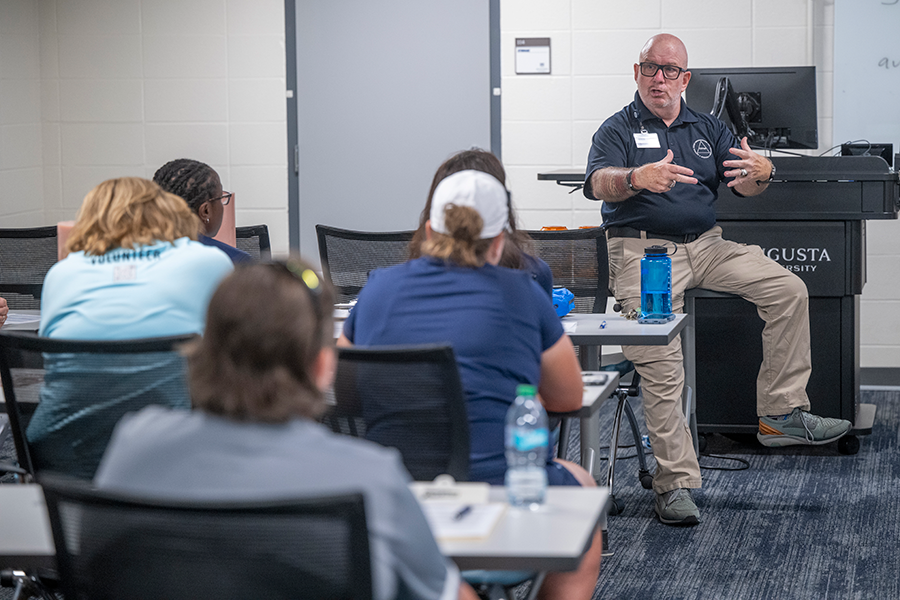
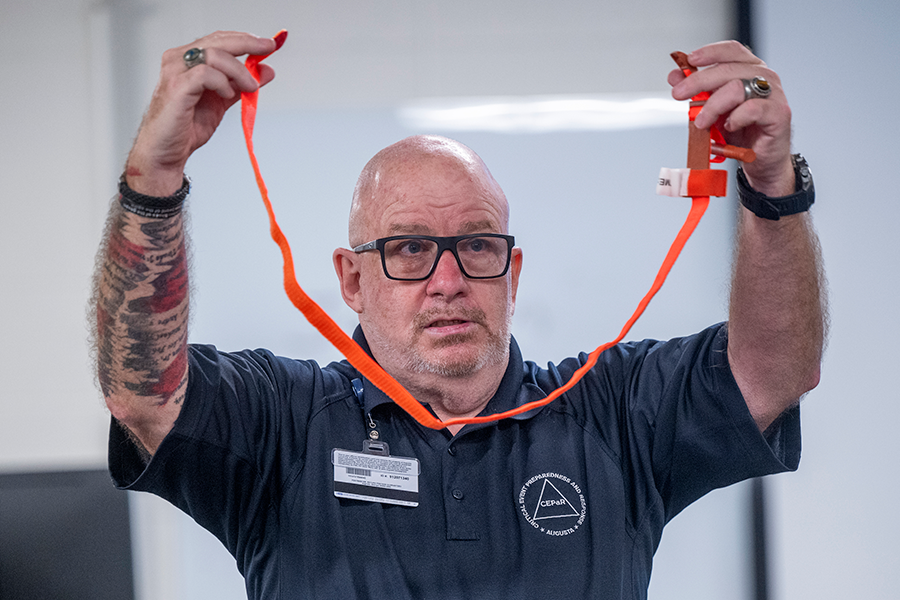
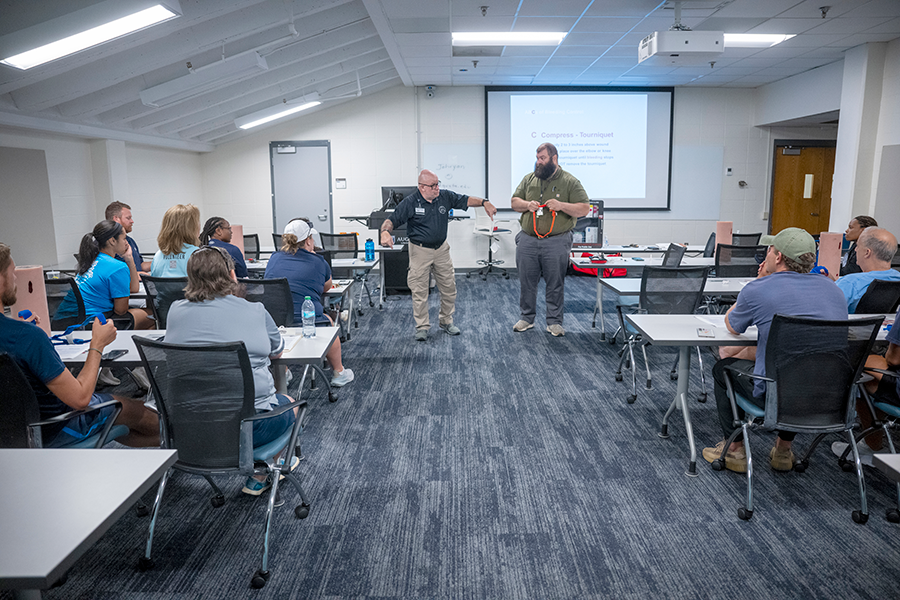
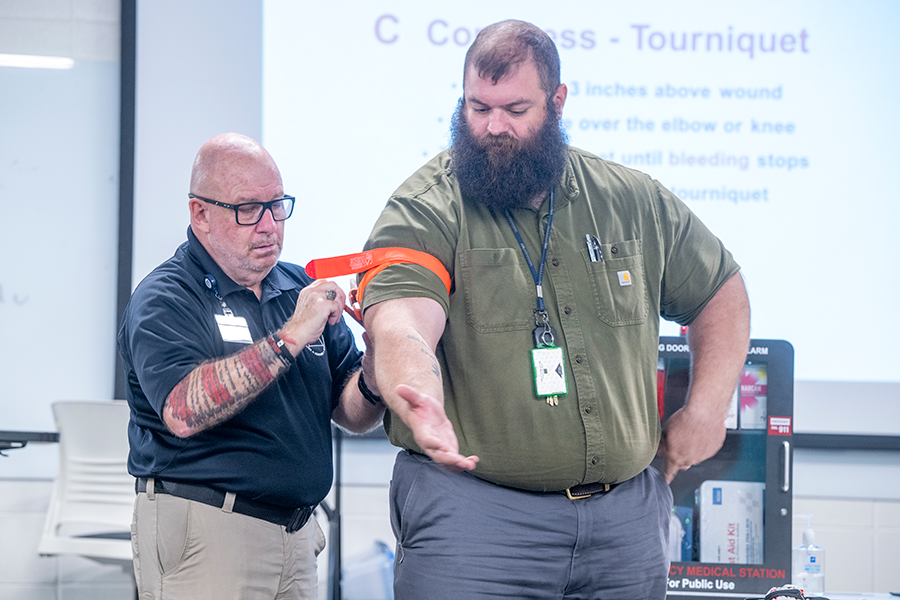
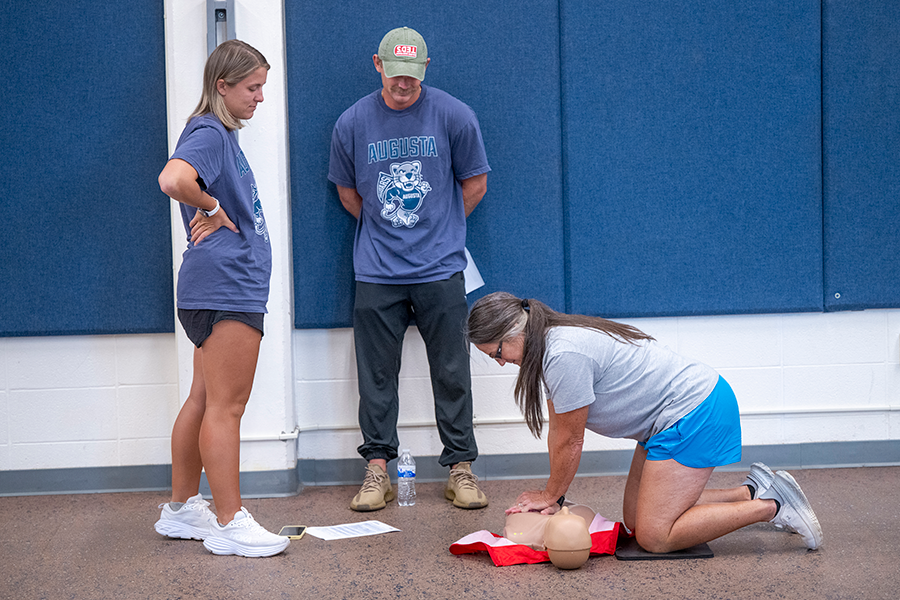
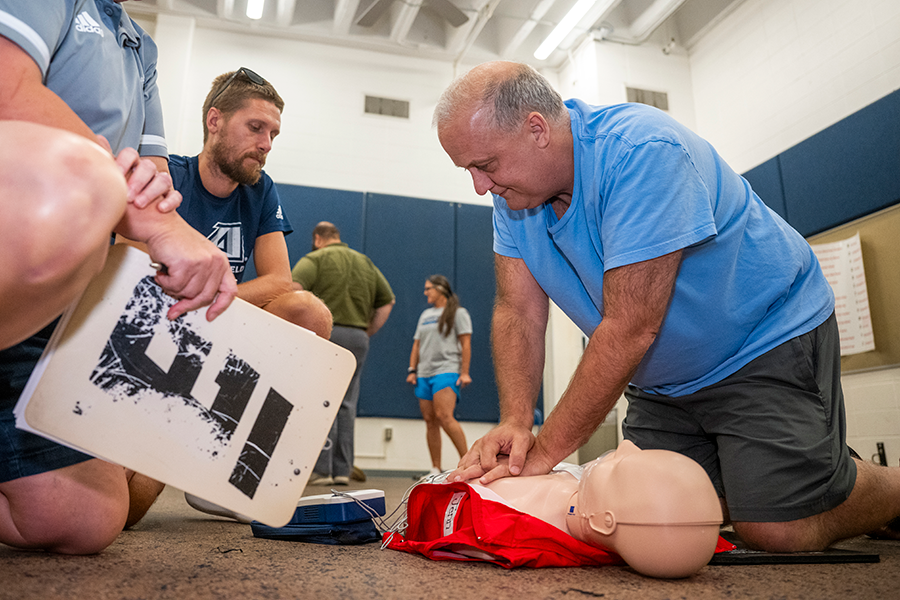
“The key to the effectiveness of the program is training the immediate responders to step into the void between the 911 call and the arrival of the professional first responders,” Ryan said. “This training empowers our people to support one another in times of crisis and builds on the JAG Safe effort we champion here at AU.”
The cabinets will be strategically placed near fire extinguishers and will include more than Narcan. The cabinets will include AEDs and Stop the Bleed kits, with room to add a first aid kit later. The cabinets will also include an alarm to help draw attention and more help when opened, as well as information on how to use each of the different kits, both in physical form and digitally through a QR code.
“All of this is in an effort to centralize all of the life-safety emergency equipment into one place,” said Jennifer Sosebee, a CEPaR coordinator. “Currently, some of our equipment is spread out with a fire extinguisher in its own cabinet, first aid kit in another area, AED nearby, so our idea was to put it all in a central location, make it very noticeable for a students, faculty, staff and anybody who might be in one of our spaces and could need it.”
“Key to this implementation has been the depth of collaboration among the internal stakeholders across multiple disciplines to develop the initiative and make it a priority for our campus,” said Larkin. “Using best practice by placing the Narcan within SAFE boxes and strategically locating them to be readily available in case of an opioid overdose, along with focused education to students, staff and faculty on its proper use, we are taking focused and proactive measures in providing safe and accessible interventions for emergencies throughout our campus footprint.”
 Augusta University
Augusta University
